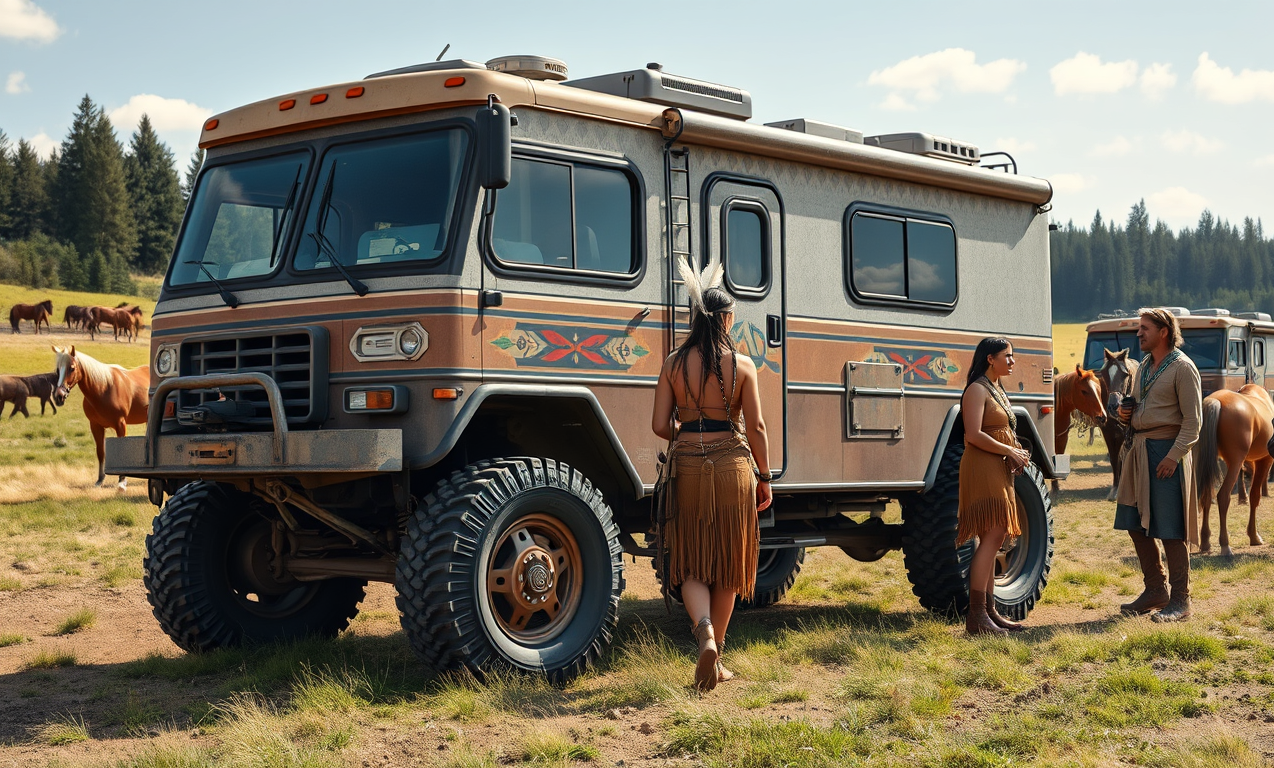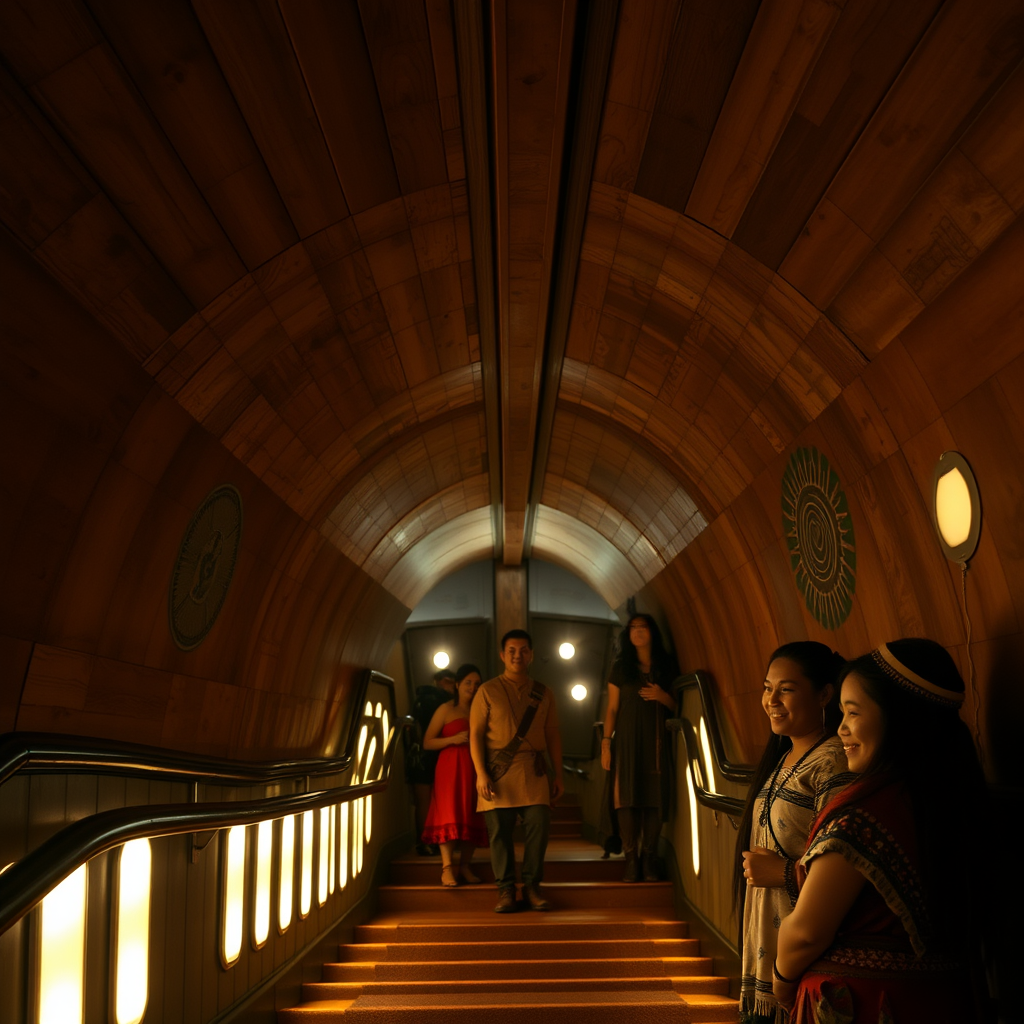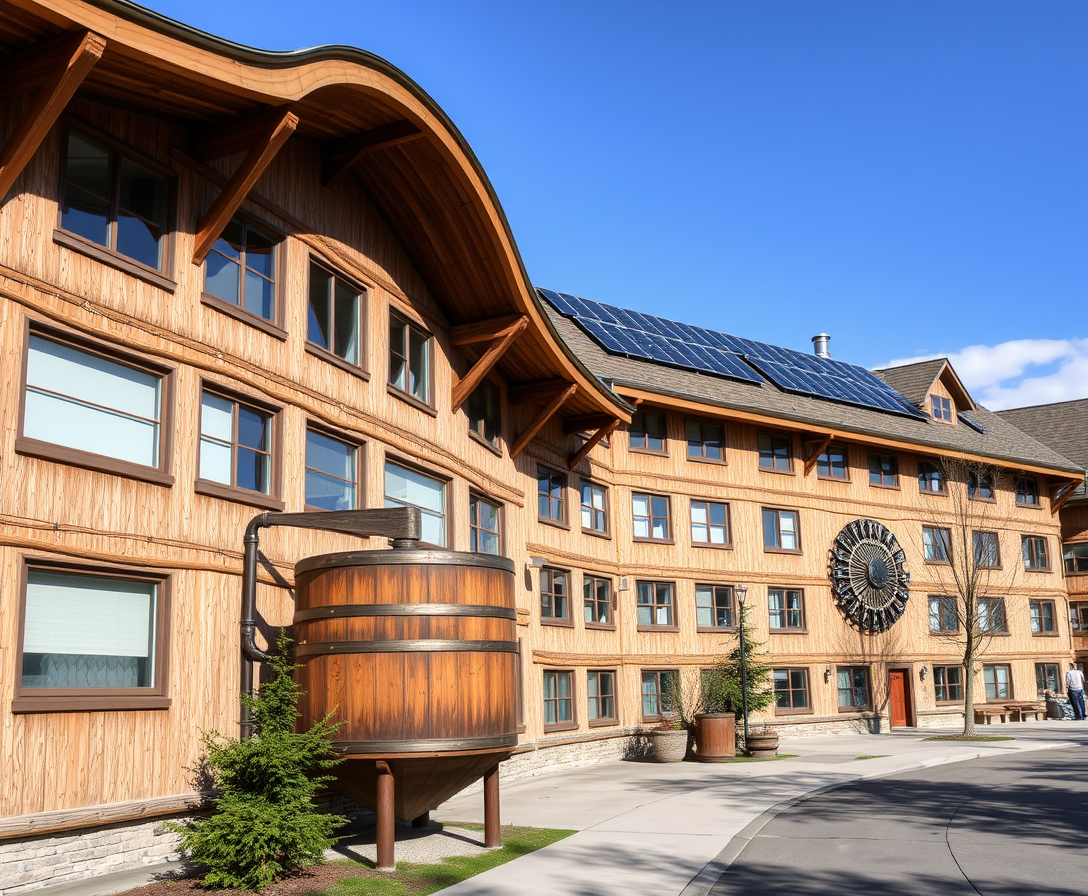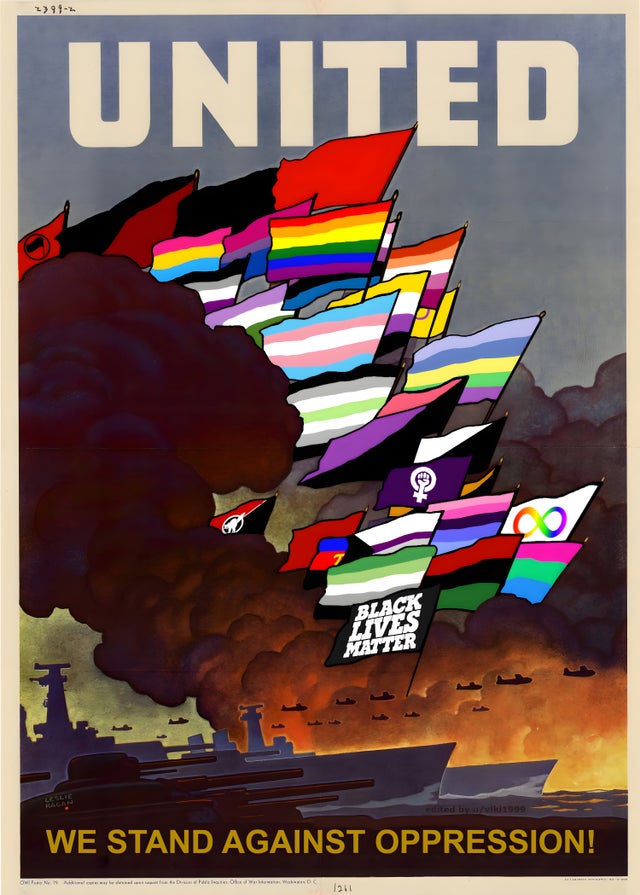I've posted about this world before here and here.
It's an alternate history. Colonialism never happened in the first place. The world remained tribal, and traditional cultures remain strong. But 21st century tech develops. There is a lack of capitalism and exploitation.
I downloaded these pics from the multiversal interwebs:

Traditionally nomadic cultures – such as this Australian bushman – remain nomadic in the 21st century. But their lives are made easier by technology. Under capitalism, developing technology keeps some people poor but increases the wealth of a few. In the solarpunk, non-colonial world, people use tools like this off-road tricycle to make their traditional lifestyles easier.

North American cultures follow the still-great buffalo herds. They use offroad vehicles that run on gasified biomass they harvest as they go. These vehicles are no faster than a horse. That guy on the right? I guess he's a tourist from a traditional European country; he's visiting his friends. They'll speak the Esperanto-type language to each other.

This picture was taken in a subway station in Cahokia.

This is a typical sight in the northeast megaregion. This is what the longhouses of the Haudenosaunee people look like in the 21st century.

The fishing cultures of North Europe live within the ecological limits. Some fish are still wild-caught, providing 5-10% of the diet. Others are farmed in open ocean farms. Members of a large (town-sized or city-sized) tribal confederacy have the customary right to harvest from these waters, and manage the wild stock and the farms as a commons.

My post linked above discusses guilds. One guild that exists, alongside doctors, tailors, and microchip-fabricators, is the Soapwitch guild. They have knowledge of local wildflowers, oils, and that sort of thing. Their job is to provide soap, perfume, toothpaste etc. for free to members of their tribe (instead of Unilever and Colgate doing it for profit). It's their tribe's reciprocal obligation to give them food, shelter, protection, etc.

Obviously there was a full-scale industrialization of some sort given the technological parity with our timeline. Was there ever serious ecological crisis, locally or intentionally? Did that ever threaten to produce capitalist class dynamics?
Also, what do you imagine global population is at? I would guess it's substantially smaller than our timeline, maybe just one or two billion?
I'd also love to hear about what conflicts did and do exist, what political theories developed around them, and how they were or weren't resolved. Do pre-capitalist class dynamics persist or were those dismantled, and if so, how?
Oh my you're asking me about all the bad things in a utopia.
That word 'scale'.... scale is a big theme. Yes there was full technological development, but the scale is all different:
Terra: Gigantomania, go from a spinning wheel to "a spinning mill containing 10,000 mule spindles", because the guy profiting from production wants more, bigger.
Solarpunk: Instead of the Industrial Revolution, call it a Tool Revolution. Here the spinning jenny, the spinning mule etc. were invented around the same time as Terra but never went gigantic. People had textiles in 1700 , they just spent long boring hours making them. By 1900 a spinner is, say, 50 times more productive than in 1700. That freed up a lot of time. The goal was not the biggest possible profit; the goal is to provide use-values without excessive burden.
You can rank industries like this:
In this universe, everything is shifted to the left. But not everything is wayyyy on the left. That would be impossible.
Take the most centralised, most capital-intensive industry of all: microchips. In Terra, one chip fab costs $20 billion to build, and operates with almost lights-out manufacturing.
This hackaday article talks about a guy who managed to make microchips at home. A follow-up article said, "there’s a small group of hackers more interested in making the chips themselves. What it takes the big guys a billion-dollar fab to accomplish, these hobbyists are doing with second-hand equipment, chemicals found in roach killers and rust removers, and a lot of determination to do what no DIYer has done before".
I'm not saying their chips were good quality, or those guys will replace factories. But it's a proof-of-concept. Integrated circuits can be made outside of centralised industry, and that means anything can be.
In the solarpunk world, it's midway. Not five plucky hackers, not an Intel factory either. Instead an organised guild of 5,000 engineers develop manufacturing techniques. They train makers to set up workshops in every city.
Food production is hyperlocal. Chip Fabrication is merely local: maybe a chip fab for each 1,000,000 person confederacy. Manufacturing is right-sized, not so downsized you lose the ability to do high-tech.
This model requires more labour-time – that's the downside. But labour is saved in other places, like the absence of bullshit jobs.
To take the word 'scale' in a different sense: yes this world just produces less steel, less energy, fewer cars, would have a lower GDP if you measured it. That's solarpunk. That also saves labour. Building 10 cars in a Local Motors way might be as labourious as 100 cars in a big Toyota factory.
Locally yes, e.g. the moa was hunted to extinction. Internationally maybe not.
It's smaller than our timeline, but more than two billion. There are cities: it's not all hunter-gatherers and farmers.
Conflicts: revenge feuds, and raids. Many cultures don't have war but do have raiding. Raids are part of Indo-European cultures going back 7000 years. They're smash-n-grabs that don't escalate to war. As material conditions get better, agricultural yields go up, the incentive for these go down.
Many traditional societies are classless, while some have slavery, some do not. People from no-slavery cultures find others savage and shocking. Not all slavery is morally equivalent; in some cultures it would be forbidden to use corporal punishment on your slave, or to have sex with your slave.
Globally it's really egalitarian, but there is a little inequality here and there. Just like it's overall really decentralised, but with a little centralisation.
Oh and then planned obsolescence:
Say you're a capitalist. Your duty is to maximise sales. Is it in your self-interest to make the shirt that wears out in 1 year or 5 years?
Say you're a community tailor. Your duty is make sure everyone in your local tribe has sufficient clothing (use-value). Is it in your self-interest to make the shirt that wears out in 1 year or 5 years?
Things are made more durable. This reduces the amount of labour and production to be done overall.
I've got much better answers to these now. I might do a history post when I get a chance.
Short version is:
Gallic Wars were a stalemate. The Romans gains a foothold in Gaul and Britain, but the Celts also remained strong there. A half-strength Roman Empire: and that influences everything subsequent, including that Emperor Constantine doesn't influence later religion.
Yes feudalism develops in Italy, France, Britain. But its barbarian competition is stronger.
Now yknow how in the 1400s, Portugal got good ships and contacted West Africa and then America? That happened here too but it was barbarian tribal Portugal.
Whoever gets [good ships]+[good guns] in the 1400s wins the planet. That was the Euroid imperialists in the mundane timeline. Here it's the Celts and Goths.
The Celts and Goths, when they contact West Africa and America, don't do imperialism. Instead they form alliances. Guilds train Americans and Africans in technology (notably including ships and guns).
The economic incentive is strengthening/growing the brotherhood. The Goths+Celts from Europe ally with the Berbers+Igbo+Tiv from Africa, and the Tlaxcallan from Mesoamerica. Feudalism in Europe falls before this rainbow coälition.
Now Europe has [good ships]+[good guns]+[tribal federalism]. They intervene in India on behalf of the Panchayati Raj tribes. In China, they intervene on behalf of the Miao rebels against centralised statism. In America, they help the Tlaxcallan fight off Aztec imperialism and Aymara fight off Inca imperialism.
By about 1600, the world is then won by the economic system described. Because they did they equivalent of what Feudal Europe did.
Nice! This of course raises even more questions, but it's very interesting.